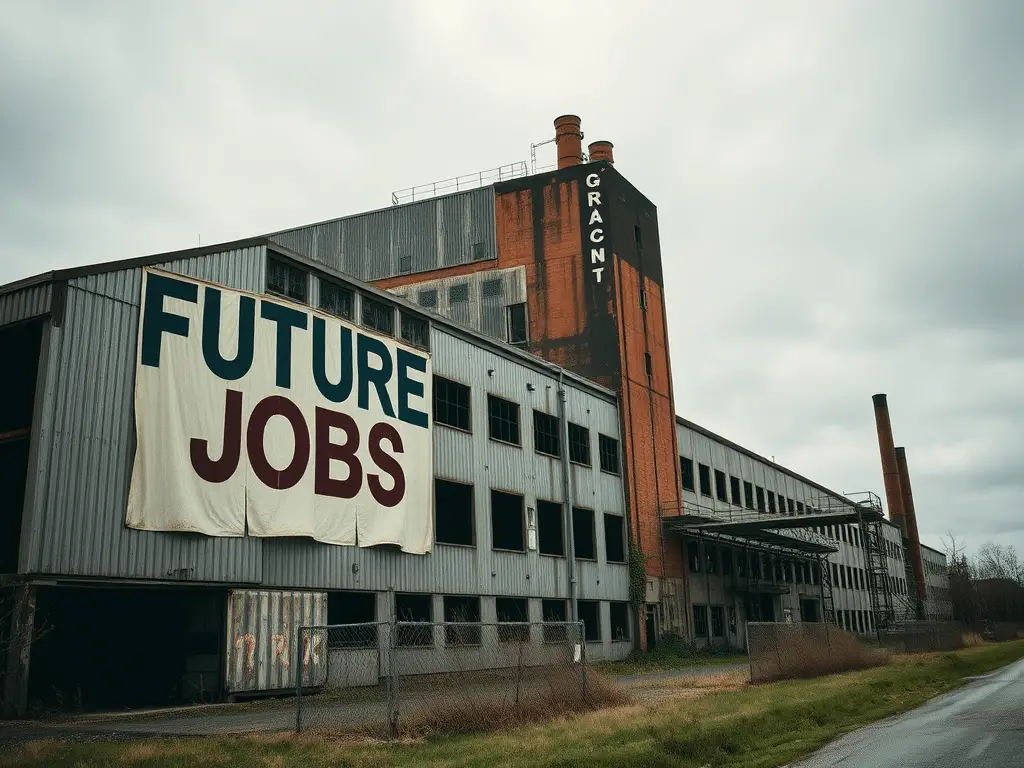State-backed job programs fail to meet expectations, delivering just 9% of promised positions from 2000 to 2020.
The Reality Behind Michigan’s Subsidy Hype

The state of Michigan has been an active participant in using government subsidies to entice businesses to create jobs, often announcing lofty employment figures in prominent media outlets. However, a recent analysis by the Mackinac Center for Public Policy has revealed a stark reality: just 10,889 jobs materialized out of the 123,060 promised by front-page announcements of Michigan job subsidies between 2000 and 2020. This equates to a mere 9% success rate—approximately one job delivered for every 11 pledged.
Billions in Job Incentives, Little to Show for It
Over two decades, Michigan offered billions in subsidies, tax breaks, and credits to corporations. Yet, many companies failed to deliver on their commitments. For instance:
- In 2009, Xtreme Power and Clairvoyant Energy promised 4,300 jobs in a redevelopment project at a Wixom plant. The companies received substantial state assistance but ultimately failed to create any positions.
- That same year, Unity Studios, projected to generate 3,500 jobs in Allen Park, similarly failed, leaving taxpayers with no return on their investment.
- Dow Kokam and other battery-related projects announced in 2009 and 2010 promised over 40,000 jobs collectively. However, they accounted for just 1,296 positions, according to state reports.
Even notable firms such as Google and Toyota failed to achieve their pledged outcomes despite lucrative incentives.
Subsidies as Political Theater?
The Mackinac Center’s report highlights how these announcements often served political purposes rather than genuine economic development. By tying themselves to splashy job numbers, politicians portrayed themselves as proactive economic stewards. The press frequently amplified these narratives, offering little skepticism or follow-up when projects faltered.
For instance, then-Governor Jennifer Granholm heralded the 2009 battery manufacturing boom as a transformative moment for Michigan. However, federal and state-funded subsidies generated only a fraction of the jobs promised, raising questions about the credibility of such projections.
A Pattern of Overpromising and Underdelivering

The Mackinac Center reviewed 41 subsidy-related stories published on the front page of the Detroit Free Press from 2000 to 2020. Only six projects met their job creation targets, and 21 created zero jobs. The remaining projects delivered less than half of their initial promises.
For example, Amazon received subsidies for distribution centers in Livonia and Romulus, delivering the promised jobs in those cases. However, most businesses failed to meet similar expectations.
Who Got the Michigan Job Subsidies
Here’s a table summarizing the top 10 subsidies in Michigan based on the uploaded document:
| Company/Project | Promised Jobs | Subsidy Amount | Details |
|---|---|---|---|
| Dow Kokam | 6,600 | $250 million (combined) | Federal and state subsidies for battery production; actual jobs fell short. |
| Xtreme Power & Clairvoyant Energy | 4,300 | Not specified | Redevelopment of Wixom plant; zero jobs created. |
| Unity Studios | 3,500 | $42 million (various) | Film studio in Allen Park; project failed to create jobs. |
| Motown Motion Pictures | 3,500 | $16.9 million (state film credit) | Proposed Pontiac studio; closed with no jobs created. |
| Grupo Aernnova | 1,386 | $18.5 million | Aerospace manufacturing; only 37 jobs reported. |
| Compact Power (LG Chem Michigan) | 1,200 | $150 million (federal and state grants) | Battery plant; met job expectations, but employees were underutilized. |
| GE Research Center | 1,200 | Not specified | R&D center in Detroit; reported only a third of the promised jobs. |
| Amazon Distribution Center (Livonia) | 1,000 | $7.5 million | Delivered promised 1,000 jobs, a rare success story. |
| Flex-N-Gate | 750 | Not specified | Detroit auto parts plant; created 652 jobs, nearly meeting target. |
| Google AdWords Office | 1,000 | Not specified | Office in Ann Arbor; dismissed tax credit deal, fell short of promises. |
Notes:
- Many subsidies involved a mix of state tax credits, direct grants, and federal funding.
- Some projects, such as Compact Power, delivered jobs but often underutilized their workforce or failed to meet broader expectations.
- Zero-job outcomes are particularly common, as seen with Unity Studios and Xtreme Power.
Michigan Taxpayers Left to Shoulder the Costs
Michigan has authorized over $23 billion in subsidies since 2001. While proponents argue these programs attract investment, the jobs created rarely justify the expenditures. Economists have repeatedly critiqued state-level incentives for their inefficiency and distortionary effects. The Mackinac Center’s report underscores the broader consequences: not only do these programs fail to meet expectations, but they also divert taxpayer dollars from potentially more effective public initiatives.
Time for Accountability With Michigan Job Subsidies
The findings raise significant questions about the transparency and accountability of Michigan job subsidies and other corporate welfare programs. Despite repeated failures, state officials have not reformed these practices, continuing to offer similar deals.
“There’s an urgent need for skepticism and oversight,” the report states. Without changes, Michigan risks perpetuating a cycle of political promises disconnected from economic realities.
Find More Interesting Feature Stories From ThumbWind
- Michigan Features: Unveiling the people, places, and events that make the Great Lake State unique, we’ll explore hidden gems and must-do activities.
- Weird Political News: A sarcastic and insightful take on official news released by government sources, Political Action Committees, and Public Officials from all over the US. All stories are true and sourced.
- Michigan News: News and events of Michigan’s Upper Thumb that are worth knowing in the region.
Your Turn – Like This, or Hate it – We Want To Hear From You
Please offer an insightful and thoughtful comment. Idiotic, profane, or threatening comments are removed. Consider sharing this story. Follow us to have other feature stories fill up your Newsbreak feed from ThumbWind Publications.



